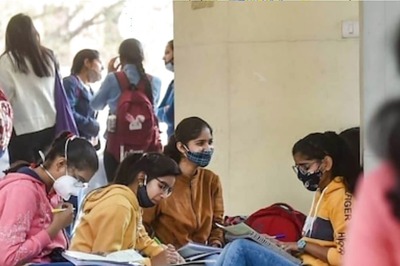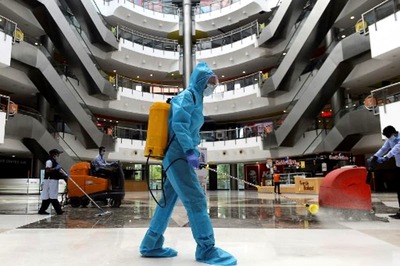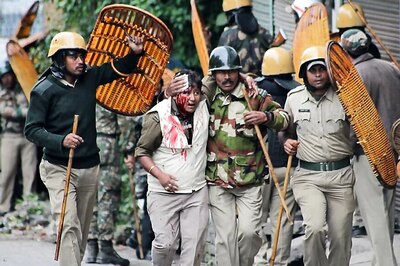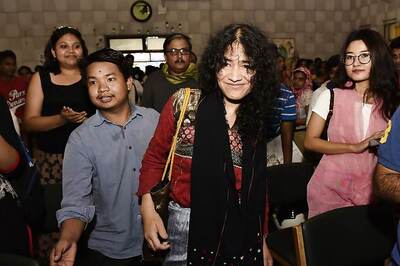
views
New Delhi: In her book, Reham Khan talks a great deal about her ex-husband Imran Khan’s anguish over 2014 Azadi March and how he felt that it was about time that he was “given the prize".
If any of that is true, then Imran’s wait seems to have paid off and the prize has finally landed into his lap. Imran was on Saturday sworn in as the 22nd Prime Minister of Pakistan. Soon after he garnered 176 votes in the National Assembly, Imran said he had waited for 22 years to get to where he was and that Jinnah was the only man who has struggled more than he has.
A cricket star-turned-politician, Imran might be the most eclectic person to have held the key to the nuclear-armed Pakistan. From the world of cricket to the rough terrain of Pakistani politics, Imran has ensured that he appeals to the masses (quite evident from the votes) and also particularly the youth of Pakistan. At the Assembly, he promised the people full accountability and development and that he “would answer to the people twice every month during the question-answer session in the Assembly."
Born in Lahore in 1952, Imran was raised in an affluent Pashtun family and educated at the most elite institutions, including Oxford. Married thrice with two kids, one of the brightest moments for him as a cricketer was lifting the World Cup in 1992.
From the current context, a picture of him holding the Cup along with then PM Nawaz Sharif could bring a sense of trepidation. Nawaz is now in jail and Imran has taken oath as the PM.
Imran is unlike the other political leaders that Pakistan has seen. He has a legacy but that’s something he’s built on his own from the cricket field. Unlike the dynasties that have ruled Pakistan over the years, Imran’s appeal has been more independent. Additionally, the man has not one case of corruption against him, probably unprecedented in the Islamic Republic.
Most of the top leaders of Pakistan, including former PM Nawaz Sharif, his daughter Maryam, PPP’s Asif Zardari, have one or multiple cases of corruption against them. Imran’s clean image that way has been a matter of great gossip in Pakistan and otherwise.
In an interview to New York Times earlier this year, Imran had thrown his weight behind the Army, still considered to be the most powerful and influential institution in Pakistan. By saying that he would carry the Army with him, he fuelled rumours that he was being backed by the Army and that he was playing into the hands of the ‘establishment’ into winning a rigged election.
The Human Right Commission of Pakistan has outrightly condemned the establishment, accusing them of siding with PTI and doling out an unfair treatment to the opposition leaders. Imran has time and again refuted such claims and even gone ahead into calling his opponents "unworthy" and "too corrupt" to be part of an alliance to form government.
His ex-wife’s claims of his gay encounters and black magic methods too have not the least made a dent in his image, something that PTI had said repeatedly. In an interview to News18 earlier this year, senior PTI leader Iftikhar Durrani had called the book ‘pornographic’. His image also stems from his governance over Khyber Pakhtunkhwa, a region which has over the years seen an improvisation in its governance. Most of that credit has gone to PTI, if not Imran.
And it is almost impossible to forget the time when Princess Diana visited Lahore in 1996 after Imran raised millions of dollars to set up what was Pakistan’s first ever cancer hospital for the poor. Diana was a great friend of Imran’s then (and first) wife, Jemima and Imran ensured that the British royal was there during his grand entry into Pakistani civil society.
His private life, with many terming it too colourful to be true, and the constant attention given to it is something that he has chosen to not fend off, if not feed. He likes the attention and is known to be a man who wants to be in midst of things and still have control.
It is an image that he has maintained over the years that seemed to have finally worked in his favour — the suave leader with a smooth yet brutal tongue. Whilst calling his party one that is centre right, Imran has time and again drifted to the extreme by occasionally backing what the Taliban believes in. He has often been called the saviour of Pakistan, the stance almost sugar coated by Imran’s support to the controversial blasphemy law along with his dream of a “Naya Pakistan". The religious overtures in Imran’s tones and speeches are hard to miss.
His mostly anti-America stand and calling the fight against terrorism “madness" has earned him the name 'Donald Trump of Pakistan' on social media. It, however, still remains to be seen how he intends to govern. Cracks have also appeared with regards to support to Imran to run the country. Soon after he won the vote in the National Assembly, Shehbaz Sharif and Bilawal Bhutto challenged Imran to fulfil his promises, with Shehbaz saying that he would hold Imran accountable for ‘stealing votes."




















Comments
0 comment